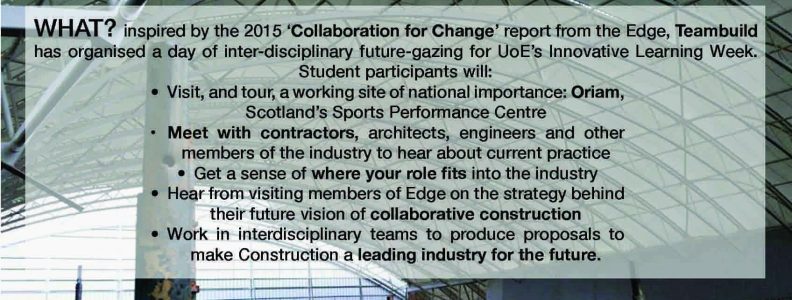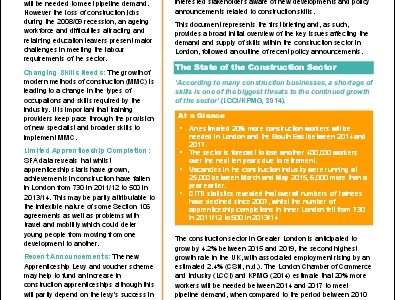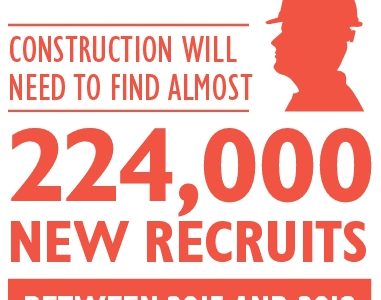SkillsPlanner was formally launched last night (Wednesday 24 February 2016) at the Institution of Civil Engineers in London.
Over 130 industry guests were welcomed by SkillsPlanner programme director Rebecca Lovelace. She then introduced Andy Mitchell, CEO of Tideway, one of our SkillsPlanner partners, who described the challenges of delivering a mega-project under London that will require contributions from 20,000 workers during its design, construction and commissioning. With research suggesting 44% of firms struggling to recruit people with the right skills, he was adamant that the industry needs to collaborate more in order to attract the people it needs to deliver future built assets. He finished with a resounding call to arms:
“This is a bold and ambitious two-year pilot…. SkillsPlanner has the potential to link employer demands for skills qualifications and behaviours to a responsive education and training sector who can train the individuals who can and will be the future of our industry. And I really hope this vision becomes a reality over the next couple of years …. let’s see what we can do to make something of this because we do need change. And this is a really exciting opportunity to secure that change….”
Sir Nigel Shadbolt, chair of SkillsPlanner partner Seme4 and co-founder of the Open Data Institute, then described the opportunity that Open Linked Data provides to give greater transparency on industry skills supply and demand, using the Tideway project and London boroughs as illustrations of the potential power of the data-driven platform being developed. “SkillsPlanner is a planning tool, an engine to help us draw conclusions about future skills,” he said. But he twice identified challenges in gathering data:
“The challenges will not be technical. Ultimately, they will turn out to be human, about how far we can persuade collaborators to actually provide data – data that is fit for purpose and that we can move from a very siloed world.”
He continued:
“Whilst we will be able to furnish the technical platform, the real challenge is getting hold of the data, finding out if it has any of the quality attributes we care about, and is it actually categorising the things we care about. Data is often presented to us with the wrong codes or the wrong sets of divisions. Given the modern workforce, it’s collected against categories that seem fit for the 1950s. How do we build dynamic classifications of this workforce? Data should not be fixed – it should be dynamic and vary through time.”
A Q&A session allowed audience members to quiz a panel of experts involved with the project. Issues included how the data might be sourced and verified, how SkillsPlanner could be used by schools to enthuse teachers and parents, and how the industry needs to be more committed to guaranteeing worthwhile jobs and future careers following training.
Reviewing the event today, Rebecca Lovelace said:
It was an amazing evening. There was a real sense in the room of people truly understanding the potential of SkillsPlanner and fully agreeing with the principle of open collaboration. The number of emails I have received today committing to supporting SkillsPlanner has been quite simply brilliant.
The number of organisations engaged with the project is a reflection of our belief that SkillsPlanner must be built collaboratively with its future users. If your organisation is interested in collaborating with SkillsPlanner, please do get in touch. It’s a truly exciting time and we will achieve so much more by working together.
 Judging from Twitter (see our Storify stream from the event, and we have more shareable content here), the event created a lot of industry buzz, with many follow-up discussions about how training providers, construction businesses and other industry bodies can get involved, particularly by supplying data. If your organisation would like to contribute to the project, please email [email protected].
Judging from Twitter (see our Storify stream from the event, and we have more shareable content here), the event created a lot of industry buzz, with many follow-up discussions about how training providers, construction businesses and other industry bodies can get involved, particularly by supplying data. If your organisation would like to contribute to the project, please email [email protected].





 Perhaps inevitably, given the volatility of the industry, almost as soon as we published the briefing, one of these sources was updated. Today, we’ve been browsing through
Perhaps inevitably, given the volatility of the industry, almost as soon as we published the briefing, one of these sources was updated. Today, we’ve been browsing through 




